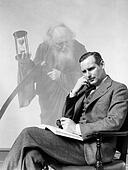 |
| Amazon - a wolf in sheep's clothing?? |
Is this Amazon's end game coming to fruition?
Amazon, having just come off a win in the courts Re its suit against big publishers regarding the agency model - coupled with Wall Street's ignoring of Amazon's continued losses - has made an aggressive move against book publishing in general by discounting bestsellers even further below loss-leader pricing (prohibited in antitrust legislation).
How can Amazon do this? I don't really know - unless it has something to do with Wall Street ignoring their losses by not downgrading their stock, thinking they will make them up later with monopolistic pricing with no competition. Also, a certain coziness with the current Washington administration.
But, will this kind of safe haven last for Amazon? Could be Amazon has acted too quickly in showing their hand! A hand many believe has always been their end mission --- to put all other book publishing out of business completely and dominate totally.
These intriguing details from Dennis Johnson, founder of MobyLives, and the co-founder and co-publisher of Melville House:
BREAKING NEWS: Amazon “declares war” on book industry
Has the vicious end game scenario we discussed just yesterday — whereby a government-sanctioned Amazon.com makes its move to cement its position as the most colossal monopoly in publishing history, and to savor the rewards — begun unfolding, and rapidly at that?
That’s what a special weekend edition of Shelf Awareness surmises. According to a report by SA editor John Mutter, late Friday Amazon, apparently to take advantage of lessened weekend attention and the company’s upcoming endorsement from President Obama …
… quietly began discounting many bestselling hardcover titles between 50% and 65%, levels we’ve never seen in the history of Amazon or in the bricks-and-mortar price wars of the past. The books are from a range of major publishers and include, for example, Inferno by Dan Brown, which has a list price of $29.95 but is available on Amazon for $11.65, a 61% discount; And the Mountains Echoed by Khaled Hosseini, listed for $28.95, offered at $12.04, a 58% discount; Lean In by Sheryl Sandberg, listed at $24.95, available for $9.09, a 64% discount; and The Fault in Our Starsby John Green, listed at $17.99, available for $6.55, 64% off ….The discounts are far below the usual 40%-50% range sometimes offered by Amazon, warehouse clubs and other discounters and are more typical for remainders than frontlist hardcovers. In some cases, the hardcovers are priced below the Kindle editions.
At the moment, the extreme discounting seems limited to bestsellers. Still, that’s a large category, and a vital one to brick-and-mortar retailers, such as to Barnes and Noble, which has re-made itself into a chain that now consists mostly of bestsellers and merchandise, and to numerous indies that need bestseller sales to survive … which could make this potentially a devastating blow to those businesses, to say nothing of the damage it could do to publishers already feeling their books are severely under-priced.
It’s a dramatic enough move to prompt one prominent bookseller — Jack McKeown, who runs Books & Books in Westhampton Beach, New York — to tell Mutter that “It’s an open declaration of war against the industry.”
Why now? In a closing more strongly-worded than is his habit, Mutter cites McKeown and others speculating that …
… Amazon has been “emboldened” by the Justice Department‘s victory against five major publishers in the e-book agency model case as well as Wall Street’s acceptance of continued losses by Amazon for now in the expectation of retail domination–and major profits–eventually. This last point was seen most recently on Thursday, when Amazon’s quarterly results included a net loss and were below Wall Street expectations but did not provoke the usual rush to sell, as is the case with most companies whose results are disappointing.Another possible reason for Amazon’s boldness is its apparently cozy relationship with the Obama administration–whose Justice Department pursued the agency model case, which mainly benefited Amazon. This relationship will be highlighted this coming Tuesday, when the president will give another major speech on the economy and aiding the middle class at, of all places, the Amazon warehouse in Chattanooga, Tenn. This is roughly equivalent of going to a Wal-Mart and calling for more of the kinds of jobs it offers.
All notions that echo our Friday commentary (and we couldn’t agree more with that last point — except to say Amazon takes reckless dis-concern for its labor to a level unachieved by Wal-Mart). But as the Shelf Awarenessreport adds, if this is indeed a sign that Amazon is playing out its end game, it’s happening much more rapidly than even we speculated, and with a dramatic dose of Amazon’s famous, always-surprising (in that it’s so unnecessary) thuggish chutzpah.
But here’s something perhaps even more surprising such a move could represent: Cause for optimism. ...
